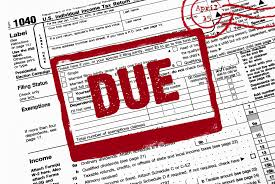Taxes Are Due – Better Late Than Never: The old saying “Better late Than Never!” applies to the filing tax of returns just as it does to most other aspects of life. With the April 15th tax deadline on the horizon, many taxpayers are rushing to file either a completed tax return or a request for an automatic six-month extension. Failure to do so will subject the delinquent taxpayer to late filing penalties that will begin to accumulate along with interest that will be charged on any overdue tax balances. Although late filing penalties can be abated in certain specific instances when there is a valid reason for filing late, the reasons for the delay must be well documented. Even when these conditions are met, the IRS does not grant this form of tax relief automatically.
According to IRS tax filing statistics, approximately 75% of those taxpayers who were expected to file a 2013 tax return had already filed a week before the filing deadline. Looking at these figures in another way, about one out of every five tax filers waits until the week leading up to April 15th to submit their return. Most tax returns (about 90%) are filed electronically. Of approximately 135 million people who will file a 2013 tax return, almost 80 million will receive a refund, The average refund is expected to be approximately $2800. These statistics mean that the IRS will be refunding over $200 billion for Tax Year 2013, about $66 million of this amount through direct deposit.
Regardless of your current or projected filing status, the CPAs and Enrolled Agents at Professional Tax Resolution would like to wish you well on Tax Day 2014. Should you be one of those taxpayers who fail to meet tomorrow’s tax deadline, we are here to help you review your tax filing and tax settlement options and communicate with the IRS on your behalf. Happy filing!
If you have tax questions or a tax debt you are unable to pay, our tax settlement professionals are happy to discuss your tax resolution options free of charge. For more information about our services, visit us today at www.professionaltaxresolution.com or call us at 877.889.6527. With over 16 years in the business of resolving tax debt, we have a thorough understanding of tax law together with the experience to know which settlement option will be the best fit for your specific set of circumstances.





